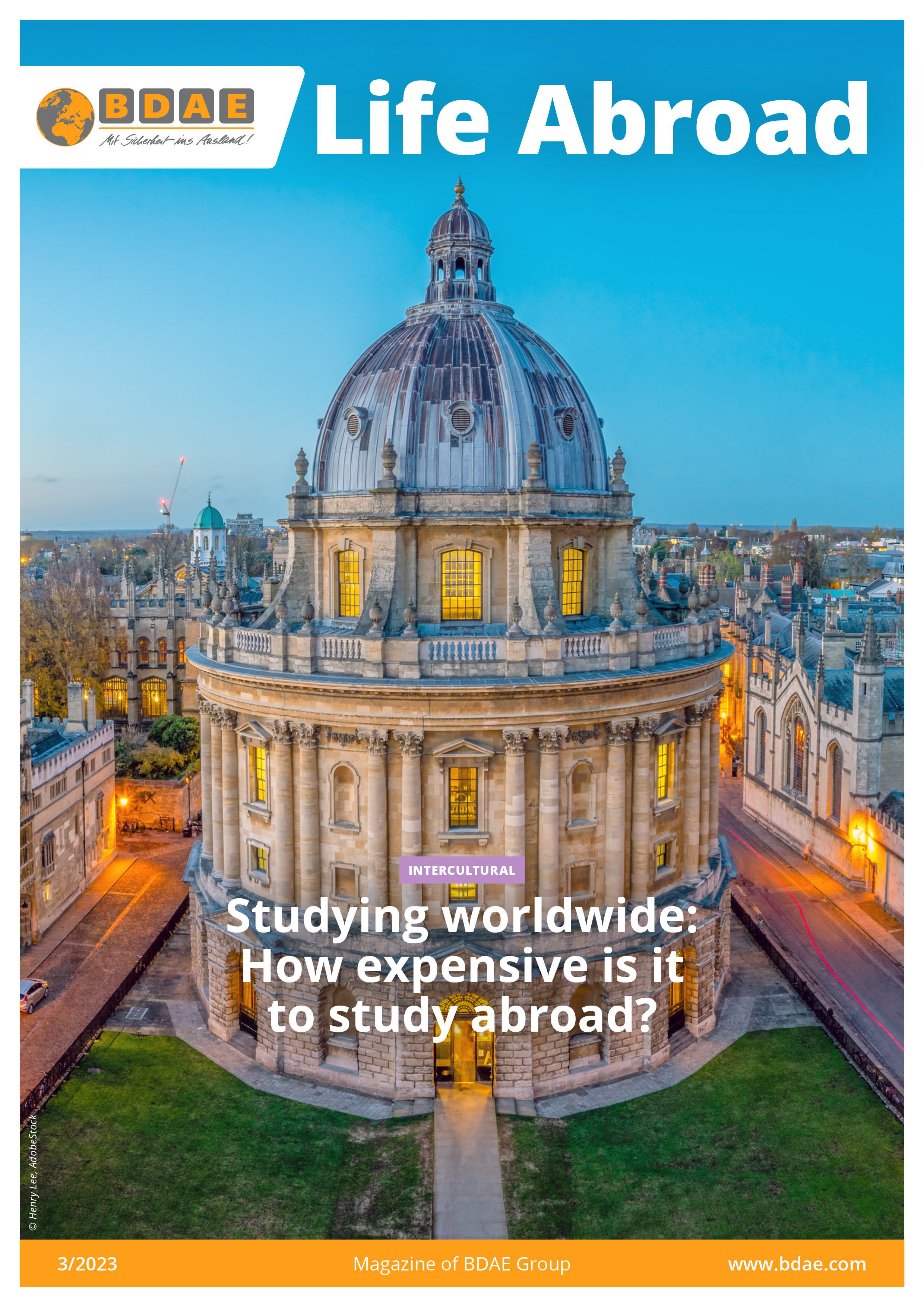"Our goal is to expand the market for purposeful shopping."
A couple named Tatiana Jimenez Cardenas and Alejandro (Alex) Alfaro Arrieta, originally from Mexico, came to Freiburg, Germany, to study computer science. As their interest in discovering new cultures and countries grew, they decided to start their online shop Multiculti in April 2023.
Their aim is to not only sell a wide range of products from different parts of the world but also to encourage people to appreciate different cultures. They want to share stories behind the products they sell.
How did you get the idea to sell products from all over the world in one place?
Tatiana: Well, we've been thinking about this idea for quite some time now. It all started with our own experience when we moved to Germany. After a while here, we began to miss our own culture, especially the flavours from Mexico. We were looking for something genuine, like when we cook. We noticed that some ingredients we used to find easily in Mexico were not available in Germany, and that's when we thought about how convenient it would be to have everything in one place.
When we got involved in international communities after moving to Germany, we realised that this isn't just a challenge for us as Mexicans – it's something every culture faces. When you go to another country, you start missing things from your home and culture. And it's not just about food; it's also about decorations and products that make you feel like you're back home.
"We still didn't have the right business."
Alex: We also tried to find the most authentic products because when we came to Germany in 2010, the options were quite limited. It has improved over time, but still, what you find in regular supermarkets might not necessarily be the best. So, we're still missing that genuine, authentic touch. Talking to friends from different cultures, we realized they felt the same way. People are always yearning for authentic things from their homeland, not just the "Germanised" versions.
That's when we thought: Okay, the offerings for these things you can find online are scattered; they're not really in one place. There are no major players because most of these businesses are really niche and quite small. Some do it just as a side gig, yet they offer such amazing products. It's remarkable how they also impact their home communities. We came across some incredible stories. All of this led us to create a platform where we can be stronger together and reach a broader audience. I believe the German market is ready for it too, as consumers are becoming more open to new things. Plus, it's increasingly important for them to consider the impact of their consumption.
"We want to create a platform where all these niches come together."
Tatiana: We looked at it from our perspective: the sellers focus on small-scale international distribution or specific regions. Alex and I come from a technical background; we probably couldn't manufacture or bring these products here ourselves. However, we can do a lot to promote the products online and make them more accessible and reachable. That's something we can offer. We've been playing with this idea for a long time. Last year, we started working on it, and we launched this spring.
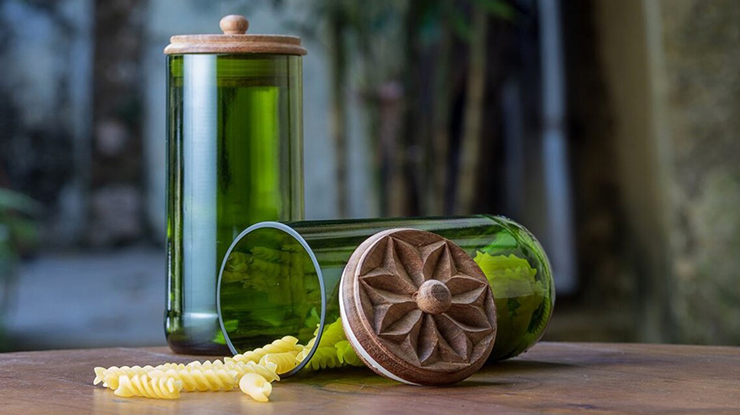 Glass jars made from recycled glass © Madukani / Multiculti
Glass jars made from recycled glass © Madukani / Multiculti
So you would describe yourselves as a platform where all the offers that are normally not connected come together and you package them and try to reach new customers?
Alex: Exactly. Our vendors already run their online shops or sell on some online platforms. The product range is really good, but sometimes that is not enough to appeal to a wider audience. Instead, the vendors target specific market niches, for example international communities in their region. For example, here in Munich or in Hamburg. These are very, very small niches. So we want to build a platform where all these niches come together so that we can make this range of high quality and impactful products available to a wider audience. Ultimately, Multiculti is an additional sales channel for the sellers. They continue to run their business as usual. But through us, they can sell more.
Tatiana: Another thing is that the audience kind of overlaps. Now that we live abroad, of course we miss Mexican things. But we've also travelled a lot more, so we've also got to know other cultures and other tastes. And I think this effect is also there for others: if someone discovers something from one country, they are perhaps generally more open to discovering something new from a completely different country. Now, if different suppliers for different goods are completely scattered, then this interest in discovering something different is lost. Because each time, the customer would have to actively search for a specific supplier.
That's exactly what Multiculti wants to do better. You go there to look for something, and while you are browsing and shopping, you are already open to new experiences, tastes and sights. At that moment, it's easier to say: "I could also try something from Thailand. Because I've been there before and I want to try that again!"
It is an effective strategy to bring the products together and then divide the clientele between the sellers. Many of them often only get one-time customers, after the purchase they are gone and would normally not come back. For example, one of our products is bathroom sinks. These are not things you buy ten times, are they? But they are ceramic works, hand-painted - they are beautiful and colourful! People who buy something like this want to bring something unique home, but they don't come back often. Such customers are looking for something very specific, but at Multiculti they will casually discover other cultures - while they are already looking for goods with a multicultural touch.
Alex: There are also things you probably wouldn't even think to search for. If you're looking for colorful clothing at Multiculti, you'll see Latin American clothing, African clothing, Asian clothing. It's a sort of blend of world cultures. Maybe you're initially more connected with, I don't know, South America. But in the end, you might end up liking something from Africa.
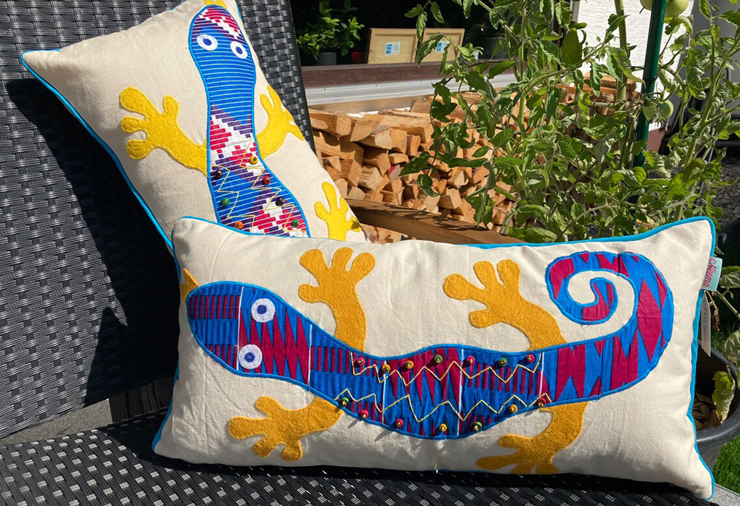 Gecko cushion cover, handmade © Madukani / Multiculti
Gecko cushion cover, handmade © Madukani / Multiculti
"Our goal is to broaden the market for purposeful shopping."
So, there's a wide variety of products. Could you give a brief overview of what you sell? Is there a specific way you choose what to include in your portfolio?
Tatiana: We have three main categories, but you could say we offer almost everything. We have fashion, food, and lifestyle, which basically means decorations and accessories. We looked at the original range of products we had and designed the categories and said, let's just start here.
But we don't just look at the product itself; we also consider the story behind the product – and how we can make a positive impact through selling that product. So, we add an extra layer: when we sell fashion items, we make sure they are handmade and that the sellers source products from fair trade. We want to be sure they are creating fair job opportunities for artisans abroad.
We also have the criterion that sellers need to support social or environmental projects, by, for instance, donating a portion of their earnings to something in the community or the country they source their products from. With our shop, we wanted to promote cultural diversity on one hand and, on the other, expand the market for purposeful shopping.
Alex: What probably sets Multiculti apart from other platforms is that we search for products that are representative of cultures. So, if something is handmade in Mexico but it's just a Halloween costume borrowed from Thai culture, that doesn't really say anything about Thailand. We want to offer products that highlight the culture of the respective country. We believe that the world's cultural heritage is somewhat endangered due to mass production. Everything seems to be mass-produced in a different country, and it's not really done with passion. We want to have products that are made with love and that truly say something about the culture they come from. They don't have to be only traditional Mexican hats; they can also be modern Mexican fashion. But it should express, "I'm Mexican, I'm proud to be Mexican."
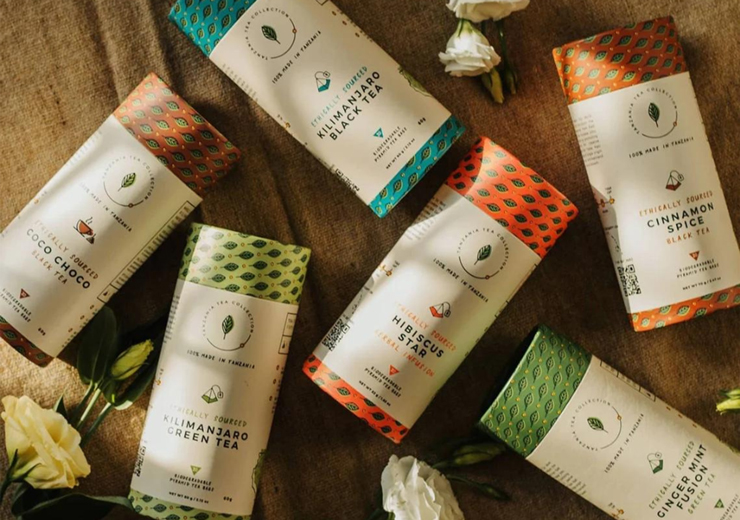 Tea Variations © Madukani / Multiculti
Tea Variations © Madukani / Multiculti
It must be difficult to apply a plethora of sustainability criteria to such a wide range of products. What is the process like behind the scenes? Can you rely on a certain standardisation - or is it the case that with such a wide range you have to discuss the sustainability criteria with each seller individually?
Tatiana: At the moment we are having one-to-one meetings. Since we are just starting out, we have a really close relationship with our vendors at the moment. Of course, we would like to grow to a size that would require a more formalised process - but right now we are working on a case-by-case basis. In a way, this links back to the idea behind Multiculti: We work closely with our vendors so we can see how they do business and where they come from. We know the stories behind the product.
Alex: We also take our own approach to being sustainable. For example, we plant a tree with every purchase. So the shop itself runs emission-neutral. It's good to have this sustainability project, which is more tangible and traceable, because on the other hand, we don't have a formalised way to certify or validate the sustainability of all our products at the moment.
Many sellers find seals and certificates to be a big challenge. Often, they say, "If I try to get these sustainability certifications, my small business will suffer." That's because these certifications are usually designed for larger companies that can afford the costs. Many certification processes require you to buy licenses for a large number of seals, which smaller businesses can't afford. Instead, we take a different approach. We assess sustainability on a case-by-case basis, talk to the people involved, and learn about their stories.
"The challenge now is to make everything look consistent."
When people shop in yourstore, can they order from anywhere?
Alex: At the moment, you can only order from within Germany, but that's also because our capacities are limited. We want to be able to deliver all over Europe. But for now, as our own marketing strategies are focused on Germany, it was easier to launch the shop for Germany.
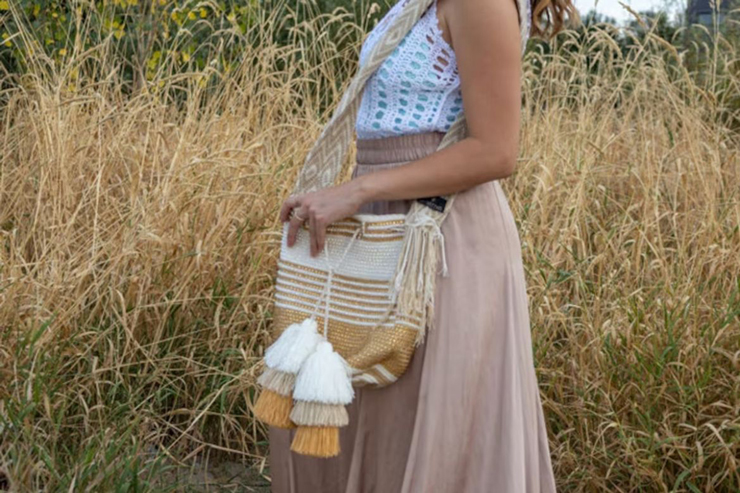 Wayuu Mochila © La Nativa / Multiculti
Wayuu Mochila © La Nativa / Multiculti
When did you start?
Tatiana: We founded the company in January and launched in mid-April, so we did a soft launch for about four weeks.
Alex: Since then, we've onboarded new sellers and partners. Initially, there were just a few, and now we're working with around twenty partners.
What have been your biggest challenges so far?
Tatiana: I think we don't have just one big challenge; we face small challenges every day. When we transitioned from the soft launch to the actual launch, one of the things was to standardize everything from different sources. Especially because the products come from different cultures and different companies – from solo entrepreneurs to companies that are still small but quite established. The challenge is to present everything in a way that looks uniform and visually emphasizes that it's all "under one roof."
I don't think we've completely tackled this challenge. Thinking about it is one thing, but when you actually do it, you realize there are so many variables. That might be a natural process, but it's still a challenge.
Alex: As we have a broad range of products, of course, we don't have thousands of products for every category. So, when a customer sees our hats, there are a few products, but it's not like we have a huge selection. Another challenge was to present all these branches of categories even though many categories have a small number of products.
You have quite a broad scope: both in terms of the diversity of products and in sourcing goods from all over the world. Are you trying to find a balance when it comes to representing different parts of the world, or maybe are you attempting to focus on a specific region?
Tatiana: I think we'll aim more for a balance. But we might focus more on certain cultural events or things worth highlighting based on seasonality. This doesn't always have to happen on the product level. Because once we've onboarded a seller, we want them to stay with us, not lose that partnership because we suddenly want to focus more on a different culture. We want this platform to contribute to their success so that the partner can continue running their business. Nonetheless, we want to consider elements and events from every culture, and we can highlight those online. If someone discovers a product from another culture, we can say, "Hey, here's something else used in a certain culture during this time of the year." That way, we can tell the story – and the impact – of a product.
Alex: We're not there yet because we have to start somewhere with our limited capacity – but the idea is to have spaces for campaigns related to these global events. We'll have a calendar for the year where we select the events that are most significant to our customers and sellers, like festivals and holidays, and so on.
We truly believe it gets even more exciting if we don't narrow it down to a specific region. Because we're targeting people who are open to discovering and learning about things that come from a tiny country in South America or similar. And then you see it for the first time and say, "Wow, this is something I didn't know, it's amazing!" That's the kind of discovery aspect of the platform that we want to highlight. And for that, we really have to be global.
Right now, you might find more products from Latin America probably because we come from there and have similar roots and perhaps more connections. But we now also have seller partners from all countries, so I don't think it will stay that way for long.
"We want to give you the opportunity to explore cultural diversity on your own terms."
Tatiana: The marketplace and the products are a very tangible aspect of our business. But our vision is still about being able to share cultural richness. That's the level that Alex mentioned, and you can actually discover other things. I think this is something quite different from inclusion, which already has a lot of initiatives. We want to provide people with the chance to explore cultural diversity on their own, to savor the variety that the world has to offer. This doesn't necessarily mean interacting with others or even traveling. It can also mean just touching, seeing, smelling, and tasting what the world has to offer.
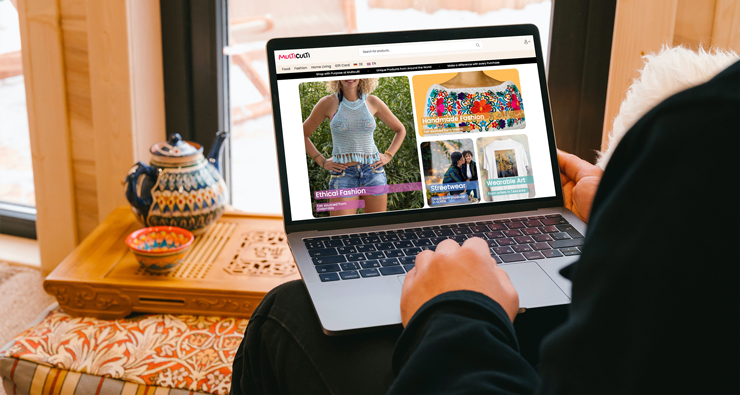 © Multiculti
© Multiculti
You mentioned the importance of providing people the opportunity to discover new cultures while they are searching for a different culture in your store. You also emphasized the aspect of storytelling: that it's not just about the products, but the stories behind them. Do you have plans to tell these stories in a blog or on social media?
Tatiana: That's in the works. We hope to execute our content strategies this summer, with different focuses in mind. One of them is showcasing the stories behind the sellers, as those can be quite fascinating. And we also want to tell stories about the products. Most of our sellers are also from abroad or locals who have a connection to a certain culture abroad. And that's exactly the audience we're addressing.
We want to tell a story within our shop, so that as you track a product, you can see what impact it has. Not every product has the same social or environmental effect – here is where our communication has potential – but we want to do this through the platform itself, not just through social media. For example, we have products that might not necessarily have a cultural connection on their own, but they have an impact on a culture. Like upcycled glasses made from bottles collected on the beaches of Zanzibar. That does have an effect, it creates jobs, and it contributes to cleaning the beaches, which is valuable for the country and the world at large. Those are the stories we want to tell.
With an online shop, your geographical location might not be as crucial. Do you still plan to attend local cultural events in the Munich area?
Alex: Absolutely! We plan to participate in some of the events that are already happening. I can't say when, but we're also planning our own multicultural festival. That's something we'd love to see in the future, maybe not too distant. I can't say much more as the idea is still in its early stages. But we'd like to have an event where people have the opportunity to touch and experience, talk to us, and spend time with the sellers. We believe that can have a big positive impact. So, that's definitely something we want to bring from the online or virtual world to the real, physical world, because it's much more impactful.
Tatiana: We've attended these types of festivals ourselves, and they're a natural source of connection with sellers for us.
Alex: Especially in Munich, there are a few of them that we'd like to reach out to and engage with.
We've talked a lot about other cultures and traveling to different places. Do you both travel often yourselves?
Alex: That changed exactly three years ago with the birth of our daughter. Before that, we used to travel a lot and enjoyed being in Asia and America and exploring Europe. Africa, that's a continent we really miss. But we love traveling. That's also why Multiculti makes sense, because we thought: Mexican culture is a rich culture. But we also love cooking Indian food, collecting souvenirs, and so on. We have a mug collection of 70 mugs from all around the world, and we just love seeing this diverse collection. (laughs)
Tatiana: You know, that's the only thing that's traveled with us. When we moved to Germany, we started traveling a bit more because it's easier in Europe. Mexico is a big country where you can do a lot of traveling within its borders, but when we moved to Germany, one of our first experiences was that you can easily connect with so many different cultures. We wanted something to collect, so we started collecting mugs. Then, after a few years of studying and working, when we returned to Mexico, that was one of the things that traveled back with us. Then we moved back to Germany, and so the mug collection traveled back and forth with us.
Alex: Traveling has slowed down a bit now because we have two kids. It's become a bit more challenging. We still try to travel, but it just involves more effort.
Tatiana: But yes, we've really enjoyed it. Overall, we've probably accumulated about ten years of traveling. Our kids are still young, but I don't want to give that up.
Do you have a favorite travel destination?
Tatiana: I think my favorite was Thailand. We had an incredible experience spending three, four weeks there, and we just enjoyed everything: the nature, the people, the food. The diversity of Thailand is very close to my heart. That applies to the animals as well.
Alex: For me, it would be Thailand, but also Colombia. A place that I really enjoyed, it's like a paradise no matter where you go. Of course, it's more similar to Mexico than Thailand.
"Diversity means fun!"
.jpg) © Tatiana und Alex
© Tatiana und Alex
Do you have an idea of where you want to go next?
Alex: We have two main candidates, I would say. It's just a matter of organization – with the little ones – South Africa and Japan are at the top of the list. We have very good friends in South Africa and also in Japan, and those are cultures that draw us there.
Tatiana: We were on the verge of traveling to South Africa, and we had this problem, a really luxurious problem: We needed a visa for South Africa, and they required two consecutive pages in your passport to put the visa there, and – I can't remember if it was Alex's or my passport – it didn't have those pages.
Alex: Too many stamps, so there were no consecutive pages left. (laughs)
Tatiana: But the passport would have been valid for another six years, and we would have needed a new one to get the visa, so we said to ourselves: Let's find another destination.
Alex: So, Japan might be next in line. (laughs)
Is there anything you would like the readers to take away?
Alex: Alex: I believe our main goal with Multiculti is to convey the message that embracing multiculturalism can bring a lot of joy. It's not just about respecting other cultures. Of course, I think that's the foundation. You can simply acknowledge that the other side is different. But if you truly engage with the other side and consciously experience diversity, you'll see that it can be a lot of fun – diversity means fun!

.jpg#joomlaImage://local-images/publications/magazine/2023-03/images/INTERVIEW_Multiculti-Founders-(1).jpg?width=300&height=300)
